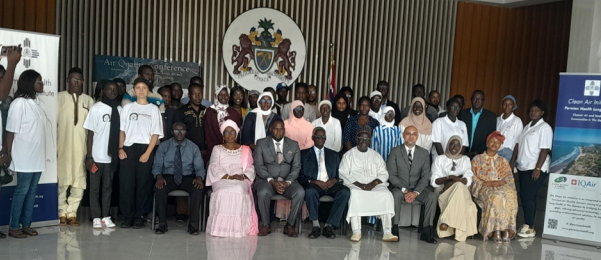By Sariba Manneh
The Permian Health Lung Institute recently hosted the inaugural Air Quality Conference in the Gambia focusing on the significant subject of air pollution.
The conference took place on September 7 coinciding with the International Day for Clean Air and Blue Skies. The conference, which was co-sponsored by the Global Allergy & Airways Patient Platform, brought together over 75 participants, including international and local stakeholders from the Ministry of Health, the National Environment Agency, the Gambia Association of Resident Doctors, the Medical and Dental Association of The Gambia, Media Houses as well as international Speakers from the United States, and Ghana.
Giving his opinion, Sunkaru Touray, MD, FACP, FCCP Co-Founder & Chief Medical Officer Permian Health Lung Institute, said Permian Health Clean Air Initiative seeks to promote lung health locally by filling critical air quality knowledge, technological, and evidence gaps in The Gambia. Through a strategic partnership with IQAIR, a Swiss-based manufacturer of air sensor technology, they have installed an integrated network of low-cost Air Quality Sensors in various locations in The Gambia, including business centres, health facilities, schools, residential communities, and national and local government agencies.
“This network will provide real-time data on air quality enabling citizens, and local authorities to quickly respond to changes in air pollution that could affect public health. In addition, Permian Health will share air quality data freely and openly in a user-friendly format that is accessible to users at our contributor page here, and on-Air Visual App- a proprietary mobile application developed by IQAir,” he said.
According to him, they will be providing data that can be used to identify sources of air pollution that impact public health and guide local actions. The Permian Health Clean Air Initiative is a promising approach to improving air quality and protecting the health of Gambians.
He added that this initiative will provide an opportunity to ensure that schools, businesses, and the government have access to air pollution data while protecting human health from the damaging effects of harmful air pollutants.
“The Permian Health Clean Air Initiative will collaborate with schools, businesses, and other stakeholders in The Gambia to install Air Quality Sensors at no direct financial cost to the partners. This partnership would not only help gather data but also create an opportunity for the partner to highlight their commitment to air quality and health and explain to their affected communities why clean air is important for their health,” Mr Touray added.
He said the collaborative effort will democratize access to air pollution data, create awareness, and disseminate knowledge about air pollution and its effects on the population, leading to better public health outcomes. “Permian Health will also provide education and training on air quality and pollution to partners who sign up for our initiative.
“Air pollution is an under-recognized cause of disease and death in The Gambia. It is responsible for about 7 million premature deaths globally,” Touray said.
He continued: “According to the Institute of Health Metrics and Evaluation (IHME), air pollution was the second highest risk factor driving most deaths and disability in The Gambia in 2019. Air pollution can cause new-onset hypertension, and increase your risk of having a heart attack and dying from it. It leads to many new cases of diabetes and can cause people to die from complications.”
Her Excellency Dr Isatou Touray, Executive Director of GAMCOTRAP, highlighted the gender impacts of occupational air pollution in the Gambia, particularly the exposure of women to air pollutants through household air pollution during biomass fuel usage for cooking.
Dr Touray emphasized the importance of involving women in discussions and decision-making processes to develop appropriate interventions. She also stressed the promotion of clean stoves and alternative energy sources to reduce household air pollution and improve lung health for women.
“To address these gaps, we launched a Clean Air Initiative- an innovative, multidisciplinary effort by the Permian Health Lung Institute that seeks to promote lung health locally by filling critical air quality knowledge and evidence gaps in The Gambia. On this page, you access information about air quality and average air quality index values for different locations in The Gambia,” she added.
Registrar of the Medical and Dental Council Dr Mohammadou Kabir Cham stresses the importance of increasing air pollution literacy in the Gambia and empowering medical and public health professionals.
Dr Cham called for a data-driven and informed approach to address the issue of air pollution as most Gambians, especially women, are exposed to air pollutants, and overrepresented in activities and occupations both in the home and outside.
“Household air pollution (HAP) from the incomplete combustion of biomass fuels during cooking is a leading source of exposure to fine particulate matter (PM2.5), carbon monoxide (CO), and other air pollutants. Women, especially in rural areas, who are involved in agriculture, gardening, fish processing, and other activities, are at an increased risk of developing poor health outcomes due to occupational exposures to pollutants during these activities,” he added.
Christa Hasenkopf, Director of the Air Quality Life Index and Air Quality Programs at the Energy Policy Institute at the University of Chicago, discussed the impact of PM2.5 pollution on human health, highlighting the unequal distribution of air quality infrastructure globally.
She stressed the need for satellite and ground monitoring data to yield good results in air pollution research, noting the success of China in reducing air pollution and the potential for other countries to learn from their efforts.
Dr Buba Manjang, Director of Public Health in The Gambia, and Dr Collins Gameli Hodoli, a lecturer at the University of Environment and Sustainable Development in Ghana, presented preliminary findings on air pollution in the Gambia. He highlighted the limited monitoring and research on air pollution in Africa and called for appropriate mitigation strategies.
Dr Hodoli discussed the use of low-cost sensors to monitor air quality and emphasized the importance of defining PM2.5 levels and sources to propose effective mitigation strategies. He also highlighted the economic burden of air pollution on the workforce.
Dr Dawda Badgie, the Director of the National Environment Agency, discussed the agency’s role in addressing air quality and public health challenges. He emphasised the implementation of regulations to improve air quality and the need for further studies on air pollution in the Gambia. Dr Badgie also dwelled on the importance of interdisciplinary collaboration.
Ismail D. Badjie, PharmD, Founder & CEO at Innovarx Global Health, harped on the potential opportunity for private sector businesses to drive innovation and efficiency in the healthcare system in the Gambia. He emphasised the need for a shift towards primary and preventative care to address the growing burden of non-communicable diseases in the country.
Badjie also discussed the economic benefits of private sector growth in healthcare, including increased employment and reduced medical tourism.




















